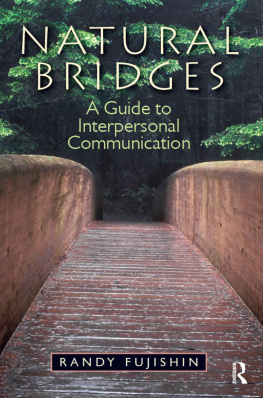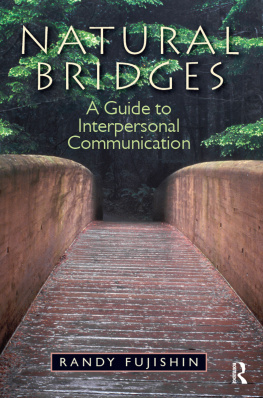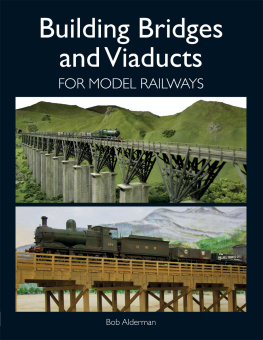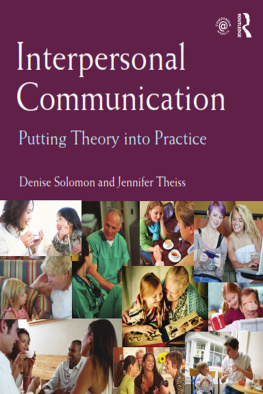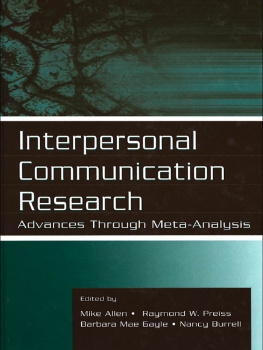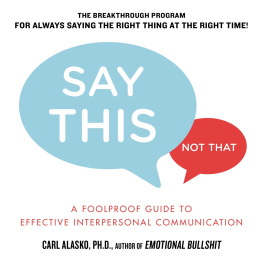NATURAL BRIDGES
A GUIDE TO INTERPERSONAL COMMUNICATION
Randy Fujishin
West Valley College

First published 2012 by Pearson Education, Inc.
Published 2016 by Routledge
2 Park Square, Milton Park, Abingdon, Oxon OX14 4RN
711 Third Avenue, New York, NY, 10017, USA
Routledge is an imprint of the Taylor & Francis Group, an informa business
Copyright 2012 Taylor & Francis. All rights reserved.
All rights reserved. No part of this book may be reprinted or reproduced or utilised in any form or by any electronic, mechanical, or other means, now known or hereafter invented, including photocopying and recording, or in any information storage or retrieval system, without permission in writing from the publishers.
Notice:
Product or corporate names may be trademarks or registered trademarks, and are used only for identification and explanation without intent to infringe.
ISBN-13: 978-0-205-82425-0 (pbk)
Cover Designer: Bruce Kenselaar
Library of Congress Cataloging-in-Publication Data
Fujishin, Randy.
Natural bridges : a guide to interpersonal communication / Randy Fujishin.
p. cm.
Includes bibliographical references and index.
ISBN-13: 978-0-205-82425-0 (alk. paper)
1. Interpersonal communication. 2. Communication. I. Title.
P94.7.F87 2012
153.6 dc23
2011019208
For Vicky,
Tyler, and Jared
Additional Books by the Author
The Natural Speaker
Creating Effective Groups
Discovering the Leader Within
Creating Communication
Gifts from the Heart
Your Ministry of Conversation
BRIEF CONTENTS
CONTENTS
The most significant skill you will learn during your lifetime is the ability to communicate effectively with another human being. To be able to speak and to listen with openness, flexibility, and kindness. To be able to build bridges that allow you to connect to the minds, hearts, and lives of others.
Your interpersonal communication skills will determine, to a great extent, the quality of your relationships, your level of professional achievement, and your personal satisfaction of a life well lived. In the end, all else pales in comparison to your ability to speak and listen well with others.
In presents the significant role listening plays in establishing and maintaining clear channels of communication to understanding and connecting with others.
concludes the book with a focused discussion on how these basic skills can be implemented in the workplace in ways that will increase your communication effectiveness and enhance your professional success.
The purpose of this book is to provide you with a practical, easy-to-understand, and encouraging guide to interpersonal communication. Its intended to present not only the basic principles and skills of effective communication in your everyday face-to-face interactions, but more importantly, how to use them in ways that establish meaningful connections with others and to build bridges to the minds, hearts, and lives of others.
I would like to take this opportunity to acknowledge some special people who made this book possible. Toni Magyar, my editor, for her skillful guidance, encouragement, and support. Karon Bowers, editor-in-chief, for her wisdom, counsel, and friendship through the years. Jeanne Zalesky and Melissa Mashburn, my acquisitions editors, for their original interest and encouragement in this project. My good friends Paul Sanders, Steve Richmond, Pastor Van Cummings, and Marilyn Cummings. My sisters, Diane Sakauye, Melanie Cottengim, Nanette Vidales, and Teresa Gruber. My mother, Helen Fujishin. My best friend and bride, Vicky, whose love and companionship for almost 30 years has given me my clearest glimpse of heaven. And our two sons, Tyler and Jared, who have blessed us beyond measure. To all these people, my deepest gratitude.
Randy Fujishin
Building Bridges to Others
Theres a story about a traveler who came upon a bridge to a city and saw an elderly man sitting near the entrance to the bridge.
Old man, tell me what the people are like in your city, insisted the traveler.
Well, asked the elderly man, What were the people like in the city youre from?
They were cold, untrustworthy, and hateful, snapped the traveler with a frown.
You will find the people are the same here also.
If thats the case, grumbled the traveler, Ill just continue my journey elsewhere. With those words, the traveler turned and walked away.
Later that day, another traveler came upon the same bridge. Seeing the elderly man he greeted him warmly, Hello, friend! What are the people like in your city?
Well, asked the elderly man, What were the people like in the city youre from?
They were welcoming, trustworthy, and loving, smiled the traveler.
You will find the people are the same here also, he smiled in return.
The traveler gently touched the old mans shoulder and said, Thank you for your kind words, friend. I think Im going to love meeting the people in your city.
And as the traveler stepped onto the bridge, the elderly man whispered to himself, And they will love meeting you.
During your journey on earth you will encounter many people and you will have an impact on each individual you meet along the way. Whether its a neighborhood acquaintance, a colleague at work, a good friend, a family member, or even a stranger on a bridge, you will either enlarge or diminish the person each time you interact.
Even your most fleeting exchange can have a positive or negative impact on another person. And over the span of your life, the accumulation of all your interactions with others will determine, to a great extent, the quality of your life.
Every time you communicate with another person you either enlarge or diminish that individual. The first travelers harsh tone, frown, and terse response were reflected in the elderly mans prediction that the traveler would find the people across the bridge cold, untrustworthy, and hateful.
The second travelers friendly greeting, smile, positive response, and gentle touch was also reflected in the elderly mans prediction that he would find the people across the bridge welcoming, trustworthy, and loving.
The same city, yet each traveler would experience an entirely different people based on his communication behavior toward them. You have the choice to build a bridge and not a barrier to another person.
The single most important skill you will learn in this life is the ability to communicate effectively and lovingly with other human beings. Not just with your loved ones and friends, but also with everyone you encounter each day of your life. The cashier at the 7-Eleven, the colleague at work, the waitress at Dennys, the salesclerk at Sears, the next-door neighbor, and the kid selling magazines at your front door. All these people and more make up the fabric of your lifes tapestry. No matter how fleeting or extended the exchange, your willingness and ability to communicate effectively and lovingly in each instance will establish a bridge to another person.
Family therapist Virginia Satir has suggested that once a human being has arrived on this earth, communication is the single most important factor determining what kinds of relationships he makes and what happens to him in the world.
The two travelers will experience vastly different life journeys because of their willingness or unwillingness to reach out, connect, and enlarge others. What kind of a life journey will you have?
Next page
